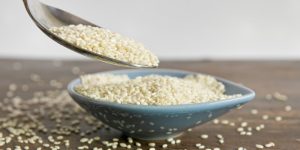- Beta-Carotene
- Calcium
- Copper
- Fiber
- Folates
- Iodine
- Iron
- Magnesium
- Manganese
- Niacin
- Omega-6 fatty acids
- Pantothenic acid
- Phosphorus
- Phytic acid
- Potassium
- Pyridoxine
- Riboflavin
- Selenium
- Sodium
- Thiamin
- Tyrosine
- Vitamin A
- Vitamin B1
- Vitamin B2
- Vitamin B3
- Vitamin E
- Zinc
Sesame Seeds – sources, health benefits, nutrients, uses and constituents at NaturalPedia.com
06/21/2017 / By Russel Davis

Sesame seeds are known for their nutty flavor and delicate, crunchy texture. Because of these characteristics, sesame seeds have long been a part of the Asian culinary arsenal. An article in WHFoods.com noted that sesame seeds are the main ingredients in tahini or sesame seed paste, and the popular Middle Eastern sweet called halvah. Sesame seeds range in colors including white, brown, and black. The phrase “open sesame” is rooted from the sesame seed pod’s distinct characteristic of bursting open upon reaching maturity.

List of known nutrients
As with other nutritious seeds, sesame seeds are a rich source of essential vitamins and minerals that contribute to many health benefits. According to an article in Nutrition-and-You.com, sesame seeds contain:
Medicinal uses for sesame seeds
Sesame seeds contain essential oils that reduces cardiovascular strain. Likewise, the high magnesium content in sesame seeds promote vasodilation, which in turn lowers blood pressure levels. Sesame seeds are also contain a potent antioxidant and anti-inflammatory compound called sesamol. Sesamol is known to possess an anti-atherogenic properties that improves overall cardiovascular health. Additionally, sesame seeds are a rich source of oleic acid that simultaneously curbs bad cholesterol levels and increases good cholesterol rates. Sesame seeds are also known to prevent atherosclerotic lesions.
Aside from its cardiovascular benefits, sesame seeds are also found to contain high levels of phytate. Phytate is a unique anti-cancer compound that serves as an antioxidant and fends off the harmful effects of free radicals. Sesame seed consumption is often associated with lower risk of leukemia, breast, lung, pancreatic, colon, and prostate cancers. Sesame seeds are notably effective in diabetes prevention and management too. According to experts, sesame oils may actually bolster the effects of certain type-2 diabetes medications such as glibenclamide. Sesame seeds are found to improve the drug’s functionality and regulate insulin and blood sugar levels in patients.
In addition, sesame seeds are an excellent source of dietary fiber that promotes the overall digestive health and prevent the onset of certain conditions such as constipation and diarrhea. On the other hand, sesame oils contain strong antibacterial and astringent properties that eliminate Streptococcus bacteria — a bacteria closely associated with oral cavities.
Furthermore, the anti-inflammatory effects of sesame seeds are especially beneficial in relieving rheumatoid arthritis. Likewise, the high copper content in sesame seeds are known to fortify the blood vessels, bones, and joints. Sesame seeds are also known to improve the overall respiratory health, and provide protection against the harmful effects of radiation. Sesame seeds are beneficial to the skin and hair too.
Body systems supported by sesame seeds
Sesame seeds are beneficial to the heart, as well as the digestive and respiratory systems. The flavorful seeds also support the bones and joints, the skin, and hair. Likewise, sesame seeds are notably effective in maintaining good oral health.
Ways to use sesame seeds
Sesame seeds are popular flavorings to a variety of meat dishes, especially in Chinese cuisine. Sesame seeds are also a staple in soups and even desserts. TheSpruce.com has compiled some of the most interesting recipes that feature sesame seeds.
Where to learn more
- Study: Using Sesame Seeds is Superior to Tylenol for Knee Arthritis
- Open Sesame: 10 Remarkable Health Benefits Of This Amazing Seeds
- Open Sesame: 7 Collective Benefits Of This Powerful Seeds
- Study: Sesame Seeds Work Better Than Tylenol “Drug” to Ease Knee Pain
- Sesame Seeds: the Most Powerful Seeds for Your Health
Summary
Sesame seeds prevent heart disease, cancer, and digestive issues.
Likewise, sesame seeds stave off diabetes, rheumatic pain, and oral cavities.
Sesame seeds are beneficial to the heart as well as the digestive and respiratory systems.
Sesame seeds also support the bones and joints, the skin, and hair.
Sources include:
Tagged Under: sesame seeds




















